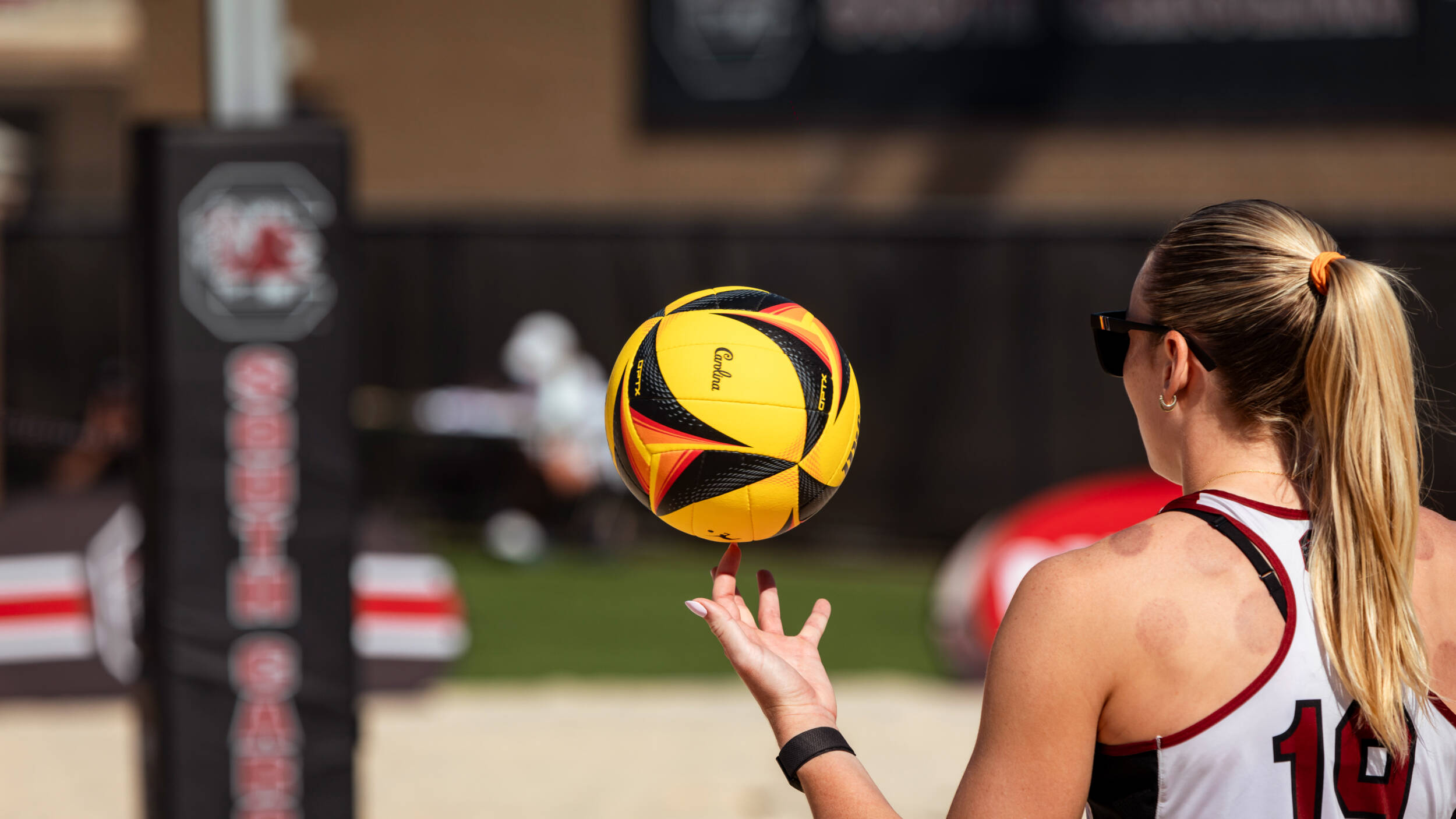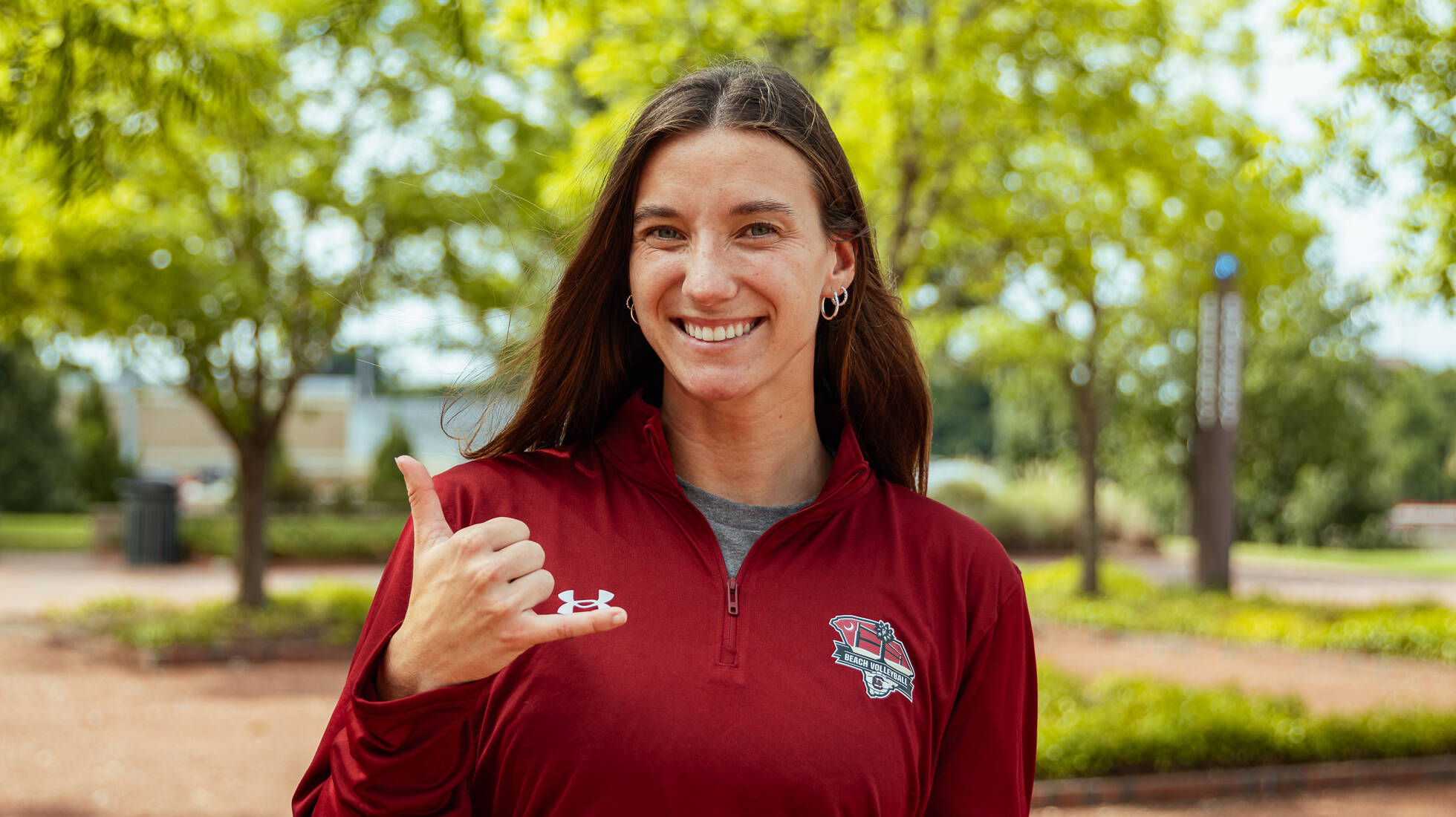Aug. 30, 2016

A favorite back-to-school essay revolves around the theme of “What I did on my summer vacation.” South Carolina senior beach volleyball student-athlete Erin Neuenfeldt and recent graduate Raina Johnson from the women’s soccer team may have one of the more meaningful responses after spending nearly a month in Vietnam teaching underprivileged children as part of the Coach for College program.
“I learned how much you can impact other people, even when you don’t think you’re really doing anything,” Johnson said. “I thought I was just going there to teach and to coach. I definitely didn’t think the kids would get as attached to me, or that I would get as attached to the kids as I did. It definitely had an impact on me.”
“The biggest thing I learned is to appreciate my education,” Neuenfeldt said. “These kids are riding their bikes an hour to get to school each day. A lot of them aren’t going to be able to continue on to get a high school education, and a lot of them really want to learn. A lot of them don’t have the means or transportation to get to higher education, so I really learned to appreciate what I have.”
Coach for College is a non-profit organization that offers student-athletes the chance to teach youths in rural parts of developing countries. This is part of a global initiative to promote higher education and life skills through sports. Several Gamecocks have made the same trip in recent years. This year the two Gamecocks joined other volunteers in teaching academics courses, as well as life skills and various sports just south of Ho Chi Minh City in the Mekong Delta.
“A big part of Coach for College is teaching them life skills, setting goals and getting them to try to achieve higher education,” Neuenfeldt said. “So we tell our stories and how we got to where we are. They know a lot about volleyball, but they really hadn’t heard much about beach volleyball, so they were really interested in our universities and how sports were such a big deal at our universities.”
“I thought it would be an awesome trip to go on and also a chance to try to help some kids, while also having them help me learn more about myself in the process,” Johnson said. “I was teaching math to eighth and ninth graders, and also coaching soccer. For the first few days it was hard communicating with the kids, but we had translators. They helped with that language barrier a lot. The kids loved it when you tried to learn some Vietnamese. We tried to learn as many basic phrases as we could, and that helped a lot with communication. A lot of the kids actually knew some basic English, too.”
Johnson and Neuenfeld were amazed how enthusiastic the Vietnamese children were to get an education
“What struck me the most was how eager and excited they were to not only play the sports every day, but also to learn in the classroom every day,” Johnson said. “I was never that excited to go to school. These kids were pumped up every day.”
“Some of the kids ride their bike an hour to get to school every day,” Neuenfeldt said. “Then they ride an hour to go home. They’re so excited to be there, and they loved that there were Americans there. A lot of them have never seen Americans before.”
It was pretty heartbreaking to leave them.
Erin Neuenfeldt
Living comfortably in the United States, Johnson and Neuenfeldt had adjustments to make while in Vietnam.
“We had to sleep under mosquito nets a lot,” Johnson said. “My guest house had shower head, which was really lucky. At Erin’s guest house, they had to shower with buckets. It was really different from anything I’ve had to experience before.
“At the beginning, I was really concerned with what I was eating. By the end it seemed really normal. My house had a lot of rice and pork every day for at least two meals per day.”
Seeing how their students lived was also an eye-opening experience.
“We got a chance to visit some of the kids’ houses on the last day of camp,” Johnson said. “It was shocking. They lived with so little, but they were so happy. Living conditions definitely varied from student to student. The school was different from any school I have seen in the United States. They had minimal supplies. It was interesting to see how they live with a lot less than we are used to living with here, but it works just as well.”
“Some of them live right on the river there,” Neuenfeldt said. “Some of them are straw houses. They live very simply, but they were happy with what they had.”
The Gamecocks are accustomed to putting in long hours as student-athletes, and they certainly had to put in long hours while in Vietnam.
“The hardest part was adjusting to the long days,” Neuenfeldt said. “I’m an elementary education major, so I teach all day long, but this was nothing like that. You’re in hot conditions all day long, and you’re teaching 40 minutes in the classroom, then going outside and teaching 40 minutes of volleyball. Then 40 minutes of classroom and 40 minutes volleyball again, 40 minutes of life skills and 15 minutes of team bonding. That’s just your morning. Then you do it all over again in the afternoon.”
In the end, the hard work was worth it.
“The most fun part was getting to know the kids on a personal level,” Johnson said. “I didn’t think it was possible in three weeks to get as close to a group of kids as I did. I was shocked at how close you got. Our last competition day was probably the most fun.”
After nearly a month of being out of their comfort zone, both Johnson and Neuenfeldt said it was hard to come home.
“You just get really close to your ‘team’ because those are the ones you meet with a lot and talk about those life skills with,” Neuenfeldt said. “I got close with a lot of members of my little team. A couple of the girls looked me up on Google and said ‘you’re famous.’ They were awesome. They would hold my hand any chance they could. At the end, they gave me these little gifts they wrapped in little boxes. It was pencils or anything they had. It made me feel really special that they would give me the little that they had.
“It was really hard to go. We were signing everyone’s shirts. You get so close to them in such a short amount of time. It’s unbelievable. We’re riding away on the bus, and it’s like a movie scene. They were chasing after us on their bikes. It was pretty heartbreaking to leave them.”
“It was a different kind of culture shock when we got back home,” Johnson said. “It was really cool to see how happy they were with what little they did have. It made me more appreciative of what I have, and I realized I don’t need half the things that I have to make me happy. It’s the people that I surround myself with that are going to make me have an enjoyable life. They really put that into perspective for me.”
Now that they are back home, Neuenfeldt and Johnson discovered that they not only gave their time and energy to help the kids, but they were the recipients of great gifts as well.
“You develop such a relationship with each kid, it’s shocking to see how close you can get,” Johnson said. “There are definitely some kids I’ll remember for a really long time. I’m really thankful for that. We’re even friends on Facebook and things like that. It will be fun to see them grow up.”
“There were two kids who both knew English very well,” Neuenfeldt recalled. “They were able to speak to me without a Vietnamese translator coach helping. At the end of the trip, I gave one of them my South Carolina shirt and took a picture with him. He was just beaming that he had an American university shirt. I’m going to miss him.”












